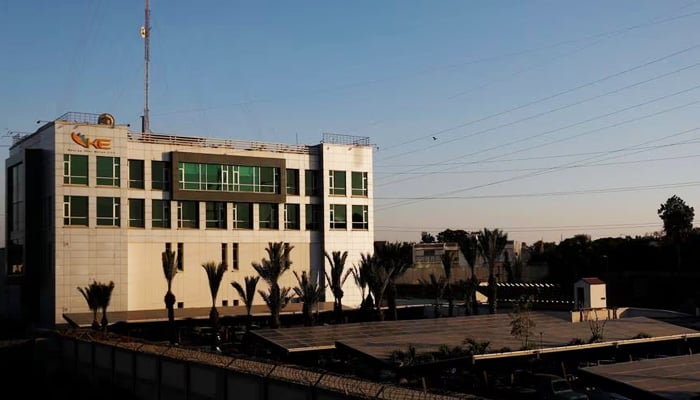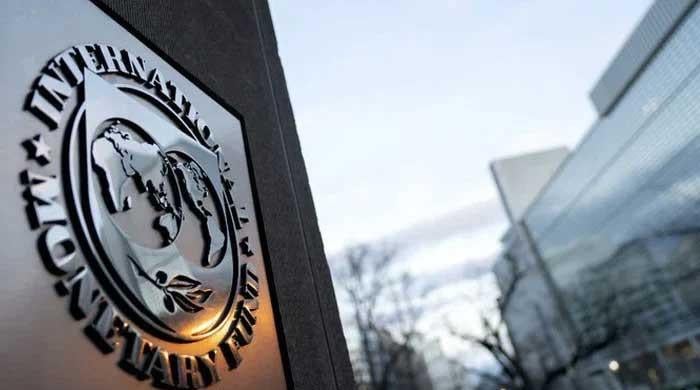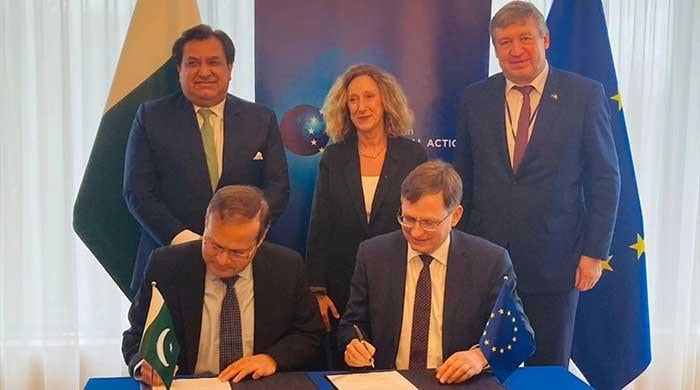SIFC committee formed to resolve KE shareholders' issues
Committe former after original stakeholders from Saudi Arabia and Kuwait raised serious concerns
October 23, 2023

LONDON: The Executive Committee of Special Investment Facilitation Council (SIFC) — set up on the instructions of Army Chief General Asim Munir — has appointed a three-member committee to resolve the issues related to Karachi Electric (KE) after the original stakeholders from Saudi Arabia and Kuwait raised serious concerns.
The powerful committee composed of the Minister for Energy (chair), Minister for Privatisation, and Minister for Law & Justice, was formed, according to sources, after the Saudi and Kuwaiti investors raised concerns at the highest level in Pakistan and requested intervention in the wake of claims made by Infrastructure and Growth Capital Fund (IGCF) about the ownership of KE.
Those with inside knowledge of the development said the decision to form a three-member committee was taken to assuage the Saudi and Kuwaiti concerns and the same message was sent to everyone involved in the dispute and claims.
The sources said that it was intervention from the highest level that in the first week of September this year, the law ministry passed directives to the Privatisation Division to maintain close vigilance on KES Power Ltd (KESP) and K-Electric’s case pending in the Sindh High Court owing to the strategic importance of the matter.
The ministry had advised the legal counsel of Privatisation Division to seek the continuance of the stay with respect to changes to KE board of directors in the proceeding currently underway in Sindh High Court between KE’s shareholder over the legitimacy of the sale of shares to Sage Ventures Limited by the liquidators of Abraaj Investment Management Ltd. (AIML) who controlled Infrastructure and Growth Capital Fund (IGCF).
In October 2022, the Sindh High Court issued an interim order preventing any changes to the composition of KE’s Board of Directors without consent from principal shareholders of KES Power namely Al-Jomaih and NIG Holdings of Saudi Arabia and Kuwait, respectively.
Shaheryar Arshad Chishty, Chief Executive Officer AsiaPak Investments Limited, confirms the same in a letter addressed to Mr Muhammad Ali, Federal Minister for Energy, Power & Petroleum.
The letter, available with this publication, says: “I welcome the formation of a three- member committee by the SIFC and appeal to your good offices to help resolve Al-Jomaih’s concerns so that we can all focus on putting KE on the path to recovery.
I am the nominated Director representing IGCF in relation to these discussions and would request the SIFC committee to invite the principal decision maker on the Al-Jomaih side for a meeting to resolve these issues in a fair and amicable manner.”
The development comes after a row started in the media as to who owns majority shares in KE.
Al-Jomaih Group of Saudi Arabia and National Industries Group (NIG) of Kuwait, collectively called as the Original Shareholders, obtained KE stake in 2005.
In 2008, Abraaj joined the Original Shareholders through IGCF SPV 21. After the 2018 scandal of Abraaj’s collapse, liquidators managed IGCF SPV 21 stake in KESP.
In 2022, Sage Ventures, a newly incorporated entity with no track record, owned by Chishty and his spouse, claimed a majority stake through back-door transactions in the Cayman Islands. This was overwhelmingly opposed by Original Shareholders i.e., the Saudi and Kuwaiti conglomerates.
In October 2022, Sage Venture Group Ltd, a special-purpose company registered in the British Virgin Islands under AsiaPak Investments Ltd, assumed the role of "general partner" for IGCF.
This transition occurred through a closed-door court process whereby AIML sold the assets of a company that was undergoing official liquidation proceedings.
A general partner raises capital from investors oversees a private equity fund on behalf of limited partners and acts as a manager. Now it seems both, the recent general partner and its parent company, are ultimately under the ownership of Chishty.
Original stakeholders contend that the assertion of majority ownership in KE lacks foundation. Acquiring the General Partner (GP) of IGCF only entails management rights, devoid of economic stake in KE. The IGCF Fund's share in IGCF SPV 21 consists solely of non-voting shares.
KESP possesses 66.4% ownership in KE.
IGCF SPV 21 holds a 53.6% stake in KESP, while the Saudi and Kuwaiti shareholders hold 46.4%. However, IGCF Fund owns only 70% of IGCF SPV21, with the remaining 30% under entities controlled by Mashreq Bank, a bank based in UAE.
In essence, IGCF Fund is not the principal owner of either KESP or KE.
In 2008, the Pakistani government granted a unique exemption for Abraaj's participation, allowing them to enter the investment venture.
Abraaj utilised a Cayman Islands-based special-purpose vehicle named IGCF SPV 21. This entity attracted over 80 investors, including Abraaj, within the IGCF Fund framework, as confirmed by records. No such approval was sought by Sage, which tried to enter the equation through concealed transactions in offshore jurisdictions, said Ashray.
Following Abraaj's liquidation in 2018 due to a significant scandal, the task of managing the company's stake, which included Limited Partners (LP) within the IGCF Fund, was taken up by liquidators. Subsequently, the original shareholders and liquidators worked together to complete the sale of KE to Shanghai Electric.
Original stakeholders, owning 30.7% of KE, and Mashreq Bank from the UAE, a key stakeholder with 10.5% see-through ownership, together hold a substantial 41.2% ownership in KE.
They share common goals, aiming to improve KE and attract foreign direct investment (FDI) in Pakistan. Since 2005, these shareholders haven't taken dividends, reinvesting the funds to strengthen KE's capabilities and drive expansion.
A legal dispute has broken out into the open between Ernst & Young (EY) (administrator appointed by Mashreq Bank) and IGCF SPV 21, a Cayman Island entity under the control of Shaheryar Arshad Chishty, concerning the recent removal of a director from the board of KESP, the parent entity of KE.
According to the court filing, KP Corporate Director Ltd (KPC), a company nominated by the joint receivers from EY — a global leader in assurance, consulting, strategy and transactions, and tax services — was overseeing the 30% Abraaj Holdings’ stake in SPV 21 and was appointed to the KESP board as a nominated Director in October 2020.
However, a dispute has now emerged when the majority ownership of IGCF SPV 21 recently changed hands through a transaction involving Shaheryar Arshad Chishty and KPC was removed from the directorship of KESP.
Court filings show that in the Cayman Islands UAE’s prominent Mashreq Bank, through their representative in EY, have also joined the legal battle as the bank is approximately 30% owners of IGCF SPV21.
The sources said that the formation of a three-member committee is likely to look at all these issues to find an amicable resolution as directed from the highest quarters while valuing the strategic relationship without causing friction with Saudi and Kuwait investors.









